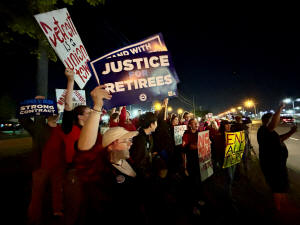Marketmind: Autoworkers' walkout to test resilience of US economy
 Send a link to a friend
Send a link to a friend
 [September 15, 2023] A
look at the day ahead in U.S. and global markets from Dhara Ranasinghe [September 15, 2023] A
look at the day ahead in U.S. and global markets from Dhara Ranasinghe
Brewing industrial action looks set to test the resilience of the U.S.
economy, and especially jobs markets, that have taken policymakers and
markets by surprise given the scale of interest rate rises over the past
year.
The United Auto Workers union launched simultaneous strikes at three
factories owned by General Motors, Ford and Chrysler parent Stellantis
early on Friday, kicking off the most ambitious U.S. industrial labor
action in decades.
The walkout by more than 12,000 autoworkers could slow an outperforming
U.S. economy should it drag on - even risking the first monthly net drop
in payroll employment in nearly three years - but is unlikely on its own
to trigger a recession.
Yet join the dots elsewhere around the globe and it's not hard to see
why markets should pay more attention to industrial strife against a
backdrop of higher inflation and a cost of living crisis in many
developed economies.

Workers at Chevron's liquefied natural gas Australia projects,
accounting for 5% of global supply, started work stoppages a week ago
after talks over pay and conditions failed. Strike action there has
helped push up gas prices.
Brighter data from China meanwhile has helped lift sentiment across
global markets, except for China, heading into the weekend.
China's factory output and retail sales grew at a faster pace in August,
but sentiment remains fragile given the country's property sector woes
with expectations for bigger stimulus high.
While Japan's Nikkei rose 1% and European shares opened higher, China
shares reversed earlier gains.
[to top of second column] |

United Auto Workers cheer for their fellow union members as they
walk out of their jobs at the Ford Michigan Assembly Plant in Wayne,
Michigan, U.S., September 14, 2023. REUTERS/Eric Cox

European markets continued to cheer the likely end of the European
Central Bank's rate hiking cycle. The ECB on Thursday lifted rates
to a record high of 4% but signalled that tightening was likely to
be its last.
And even if the ECB suggested rates would stay higher for longer,
markets are already looking past that to rate cuts as economic
growth weakens.
Wall Street was tipped to open higher, judging by trade in U.S.
equity futures.
August U.S. industrial production data could add to recent signs of
economic strength supporting investor sentiment.
Lastly, hopes for a turnaround in the moribund market for initial
public offerings are running high after SoftBank's Arm Holdings
soared almost 25% above their Nasdaq debut price on Thursday.
Arm shares jumped over 7% in pre-market trade Friday.
Key developments that should provide more direction to U.S. markets
later on Friday:
NY Sep manufacturing index
U.S. Aug manufacturing output
Uni of Michigan Sept consumer sentiment survey
(Editing by Nick Macfie)
[© 2023 Thomson Reuters. All rights
reserved.]
This material may not be published,
broadcast, rewritten or redistributed.
Thompson Reuters is solely responsible for this content. |